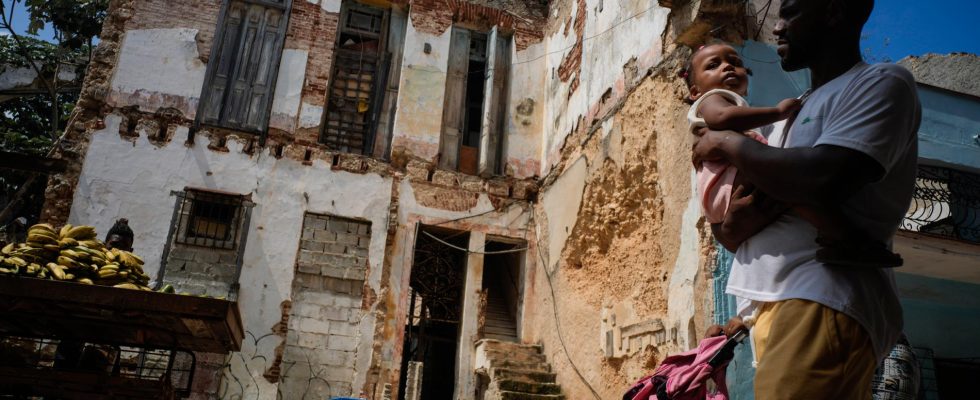1 / 3Photo: Ramon Espinosa/AP/TT
A hundred years ago, the house on Calle Villegas, in the heart of the Old Havana area, was a stately building with high ceilings, wrought iron railings and marble stairs.
Today, the house – which, according to legend, once belonged to a nobleman – is in disrepair.
Through the wall of a makeshift bathroom, the roots of a tree protrude where birds have built their nests. The facade has completely disappeared and the house appears to be leaning. Rubble and sand are scattered everywhere.
The building is one of many that in recent years has partially turned into ruins or suffered visible damage.
The residents say that they repeatedly asked the authorities for help – but to no avail. In October, three people died on the same street after a similar house collapsed.
Fears that their building will meet the same fate have grown after years of mismanagement, several weather disasters and a deepening economic crisis.
Maricelys Colás has lived in the house, on the outskirts of the Cuban capital, Havana, for almost 60 years.
– How can we avoid living in fear? Every time it rains, it feels like small stones are falling on me, she tells the AP news agency.
Acknowledge the problem
Cuba’s communist government has acknowledged the problem of dilapidated housing but says a lack of resources is preventing authorities from addressing the crisis.
Those affected wonder why Cuba’s heavy investment in tourism isn’t slowing down. In this way, the government could deal with the housing problem, they believe.
The house on Calle Villegas, which now smells of mold, is estimated to have been built in the late 18th or early 19th century. A total of six families there, three on the ground floor and three on the upper floor.
They say the building once belonged to the Marquis of Pinar del Río, who was ennobled by the Spanish crown before Cuba’s independence from Spain in 1898.
Mario Luis Poll, who has lived in the house for 19 years, walks around his apartment showing all the repairs he has made to try to keep the roof together after the floor of the room above collapsed.
Getting no response
Just above him, Marcos Villa faces another problem: The leaves of a tree are growing out of his makeshift bathroom.
In 2020, Cuba had around 3.9 million housing units, of which four out of ten were judged to be in poor condition, according to figures from the Cuban government. The deficit is 800,000 homes, says Cuba’s housing manager Vivian Rodríguez.
Those who live in the house on Villegas street demand that the house be restored – or that they be allowed to move in somewhere else. But after several attempts without even getting an answer, they are tired of asking the authorities for help, they say.
– If the marquises came back to life and saw this house, they would probably die again, jokes Elayne Clavel, who also lives in the house in Old Havana.
FACT Cuba
Cuba in the Caribbean is one of the last communist countries in the world. The country is a communist one-party state that is still strongly marked by the revolution of 1959, when Fidel Castro seized power in Havana and forced the dictator Fulgencio Batista to flee.
Cuba’s new constitution, which entered into force in 2019, states, like the previous one, that the Communist Party (Partido Comunista de Cuba, PCC) shall play the leading role in society and the state. No other parties are allowed.
The Communist Party controls all governing bodies from the government down to the municipal council. Since 1992, general elections have been held for parliament, the national assembly, for provincial assemblies and for municipal councils. But all candidates must be approved in advance by the party.
Until 2006, Fidel Castro was chairman of the Council of State, but then handed over power to his brother Raúl Castro for health reasons. In 2018, Vice President Miguel Díaz-Canel was named Raúl Castro’s successor and President of the Republic. In April 2021, he also became the leader of the Communist Party, which is considered the most powerful position in the country.
Cuba has roughly 11 million inhabitants. In the last decade, some market economy reforms have been implemented, but the economy is still largely state-controlled. Mineral exports and tourism are important sources of income, the latter of which was hit hard during the pandemic.
Source: Landguiden/UI and others
Read more
